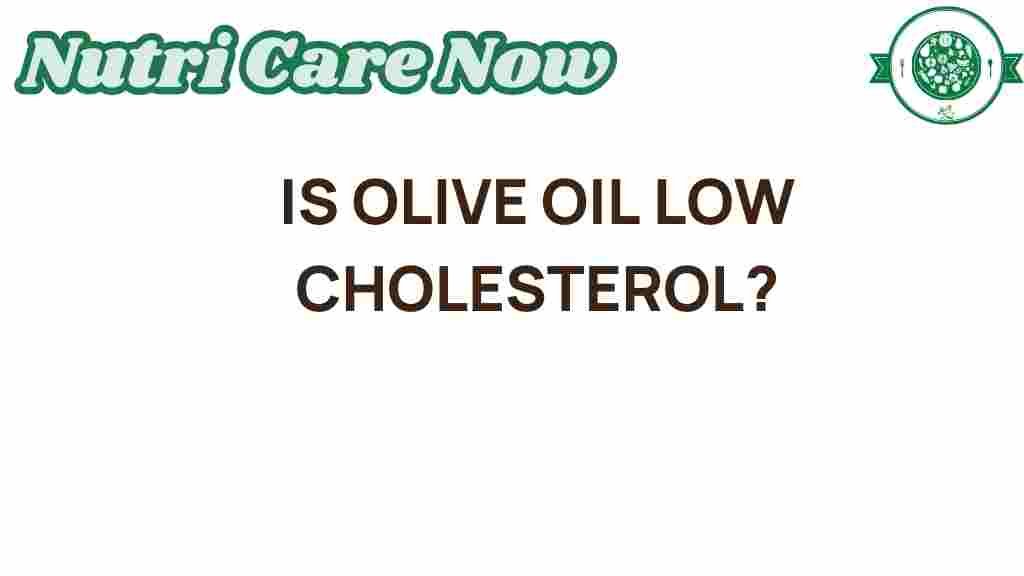Is Olive Oil the Key to Low Cholesterol?
When it comes to heart health and nutrition, the conversation often turns to dietary fats and cooking oils. Among the numerous options available, olive oil stands out as a potential champion for maintaining low cholesterol levels. But is olive oil truly the key to low cholesterol? In this article, we will uncover the truth about olive oil, its health benefits, and its role in a balanced diet.
Understanding Cholesterol and Its Impact on Heart Health
Cholesterol is a waxy substance found in your blood that is necessary for building healthy cells. However, high levels of cholesterol can increase the risk of heart disease. There are two main types of cholesterol:
- Low-Density Lipoprotein (LDL): Often referred to as “bad” cholesterol, high levels of LDL can lead to plaque buildup in arteries, increasing the risk of heart issues.
- High-Density Lipoprotein (HDL): Known as “good” cholesterol, HDL helps remove LDL cholesterol from the bloodstream.
Maintaining a balance between these two types is crucial for heart health. Many factors contribute to cholesterol levels, including diet, lifestyle, and genetics. This is where olive oil enters the conversation.
The Nutritional Profile of Olive Oil
Olive oil is a staple of the Mediterranean diet, which is renowned for its health benefits. The key components of olive oil that contribute to its positive effects on heart health include:
- Monounsaturated Fats: Olive oil is rich in monounsaturated fats, which can help lower LDL cholesterol while raising HDL cholesterol.
- Antioxidants: It contains antioxidants like vitamin E and polyphenols, which protect the body from oxidative stress and inflammation.
- Omega-3 Fatty Acids: Although olive oil contains lower amounts, it still provides some omega-3 fatty acids, which are beneficial for heart health.
The Health Benefits of Olive Oil
Incorporating olive oil into your diet can provide several health benefits, particularly regarding cholesterol management and overall heart health:
- Improved Cholesterol Levels: Studies have shown that replacing saturated fats with olive oil can lead to a significant reduction in LDL cholesterol.
- Reduced Inflammation: The anti-inflammatory properties of olive oil can help lower the risk of chronic diseases.
- Heart Disease Prevention: Regular consumption of olive oil is associated with a lower risk of heart disease and stroke.
- Weight Management: Olive oil may help with weight management, which is beneficial for maintaining healthy cholesterol levels.
How to Incorporate Olive Oil into Your Diet
To reap the health benefits of olive oil and support low cholesterol, consider the following tips:
- Use Olive Oil for Cooking: Replace butter or margarine with olive oil when sautéing, baking, or grilling.
- Dress Your Salads: Create delicious salad dressings using olive oil, vinegar, and herbs instead of store-bought dressings that may contain unhealthy fats.
- Drizzle on Vegetables: Add flavor to roasted or steamed vegetables by drizzling them with olive oil.
- Dip with Bread: Enjoy a small dish of olive oil mixed with herbs as a dip for whole grain bread.
Choosing the Right Olive Oil
Not all olive oils are created equal. To maximize the benefits, consider the following when selecting olive oil:
- Extra Virgin Olive Oil: This type is the least processed and retains the highest levels of nutrients and antioxidants.
- Check for Authenticity: Look for certifications or labels that indicate the oil is genuine and has been tested for quality.
- Storage Matters: Store olive oil in a cool, dark place to preserve its flavor and health properties.
Common Concerns and Troubleshooting Tips
While olive oil is generally safe for most people, some may have concerns, especially those with specific dietary restrictions or allergies. Here are some common concerns and tips:
- Allergies: Although rare, some individuals may be allergic to olives or olive oil. If you suspect an allergy, consult with a healthcare professional.
- Caloric Content: Olive oil is calorie-dense. Be mindful of portion sizes to avoid excessive calorie intake.
- Cooking Temperatures: While olive oil is versatile, it has a lower smoke point than some oils. Use it for medium-heat cooking to avoid burning.
The Mediterranean Diet and Its Role in Heart Health
The Mediterranean diet, which emphasizes the consumption of olive oil, fruits, vegetables, whole grains, and lean proteins, has been linked to numerous health benefits, including:
- Lower Cholesterol Levels: The combination of healthy fats and nutrient-rich foods helps manage cholesterol.
- Weight Loss and Maintenance: This diet promotes healthy eating habits that support weight management.
- Better Blood Sugar Control: The focus on whole foods can help stabilize blood sugar levels.
Incorporating olive oil as a primary cooking oil is a cornerstone of this diet, making it an excellent choice for those aiming for low cholesterol and improved heart health.
Conclusion: Making Olive Oil a Part of Your Lifestyle
So, is olive oil the key to low cholesterol? While it may not be a magic bullet, its numerous health benefits and role in the Mediterranean diet certainly position it as a valuable ally in the quest for heart health. By incorporating olive oil into your daily nutrition and making it a staple in your cooking oils, you can take proactive steps toward maintaining low cholesterol levels and enhancing your overall well-being.
Remember, moderation is key, and it’s essential to pair olive oil with a balanced diet and a healthy lifestyle. For more information on heart health and nutrition, consider visiting this resource and explore how dietary choices can impact your cholesterol levels.
Start today by making small changes to your diet, and you may discover that olive oil is indeed a key ingredient in your journey towards a healthier heart.
This article is in the category Health and created by NutriCareNow Team
